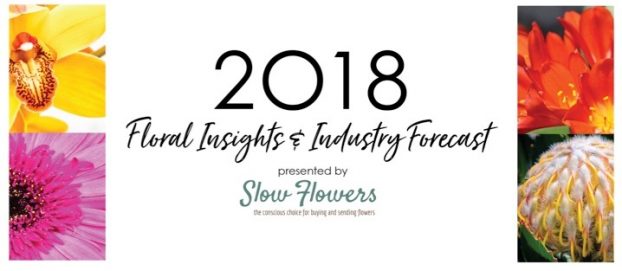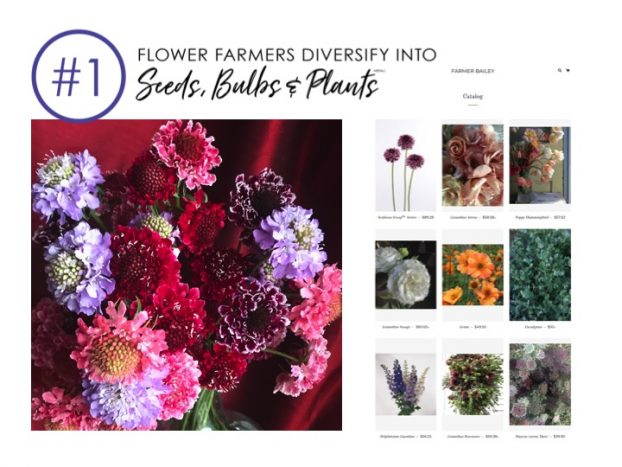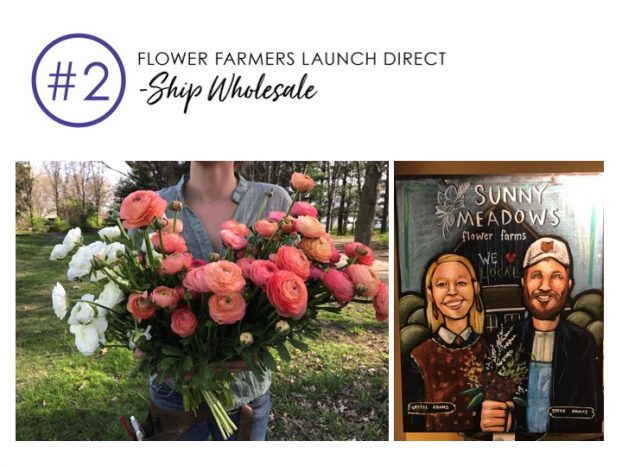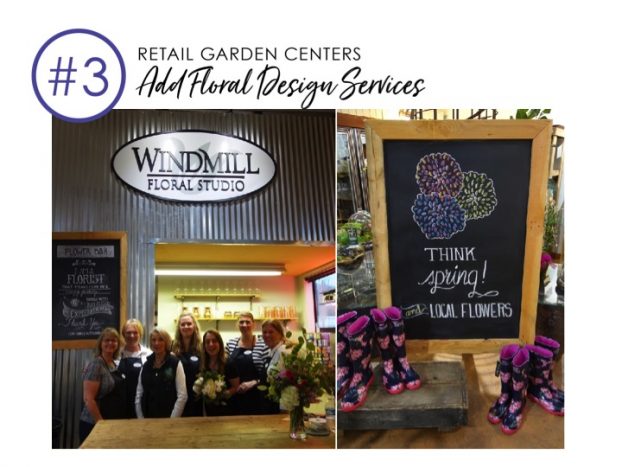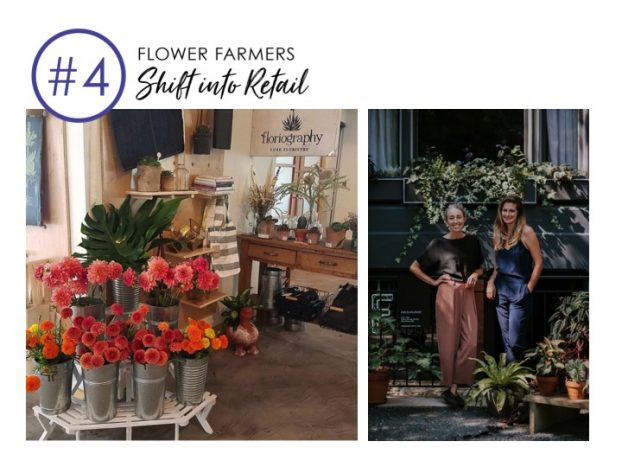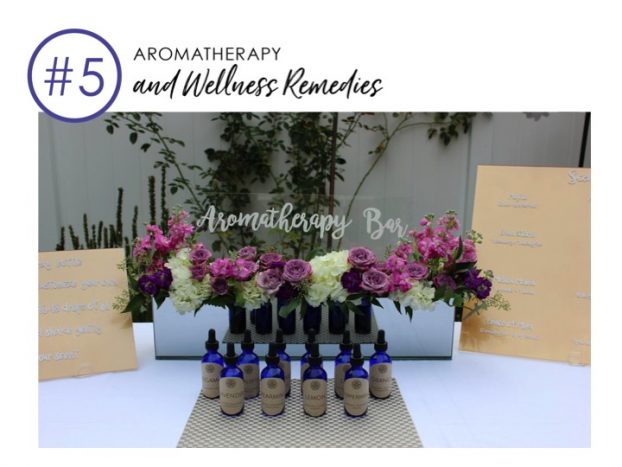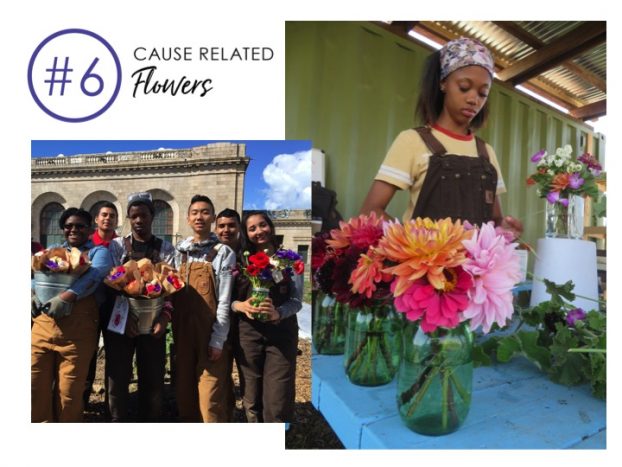Podcast: Play in new window | Download
Subscribe: Apple Podcasts | Podcast Index | RSS | More
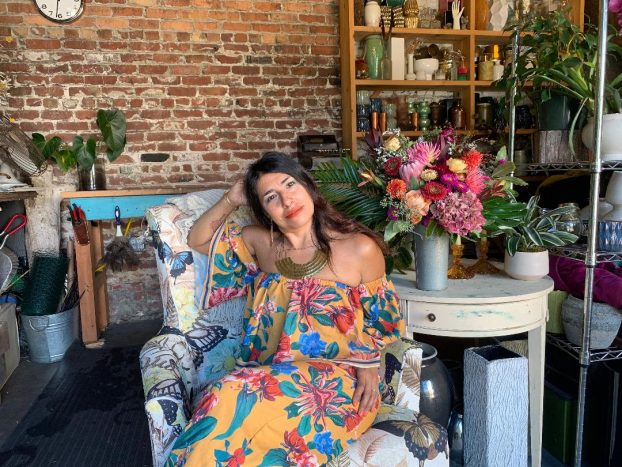
In 2013, during the first year of the Slow Flowers Podcast, I interviewed a young floral designer from the San Francisco East Bay who at the time was one of the only voices talking about sustainable design practices. I called her “Berkeley’s Eco-Floral Maven” and said this: “Pilar Zuniga is blazing a new trail and is the TRUE definition of a LOCAL FLORIST. She has a hometown, Main Street flower shop that goes the full distance to source from local flower farms in her own backyard.”
Remember, this was in the early days of Instagram. When it came to visually exciting storytelling, at least online, individual bloggers still reigned. As early as 2008 when she launched Gorgeous and Green as an event floral business, and later as a local Berkeley retail floral and gift store (2010-2016), Zuniga used her blog to write about sustainability concerns, including chemical-free design techniques and mechanics. “I don’t use sprays, glues or floral foam at all,” she explains.
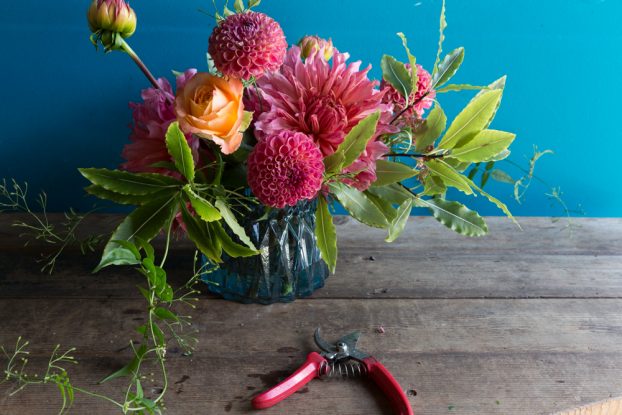
Today, Instagram is home to Pilar’s online presence, where followers are drawn to her vibrant aesthetic, often portrayed against a distinctive turquoise-teal wall, a color rarely found in flowers.
The flowers and foliage she selects are locally grown, and when available, are organic or non-sprayed as well. Gorgeous and Green supports local growers and farms who are doing their best to continue to keep local crops available in the Bay Area.
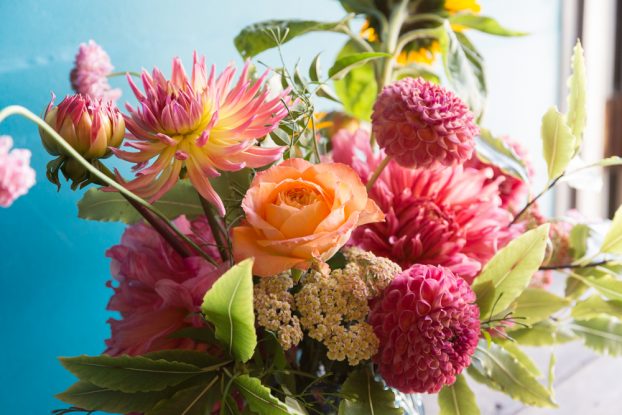
I’m so pleased to welcome Pilar Zuniga as a return guest to the Slow Flowers Podcast. I really can’t believe that seven years have transpired since early listeners of this show met her. You’re in for a treat, but as a bonus, here is the link to her first appearance in Episode 116, from November 2013) and a link to the feature about Gorgeous and Green that I wrote for the November 2019 issue of Florists’ Review.
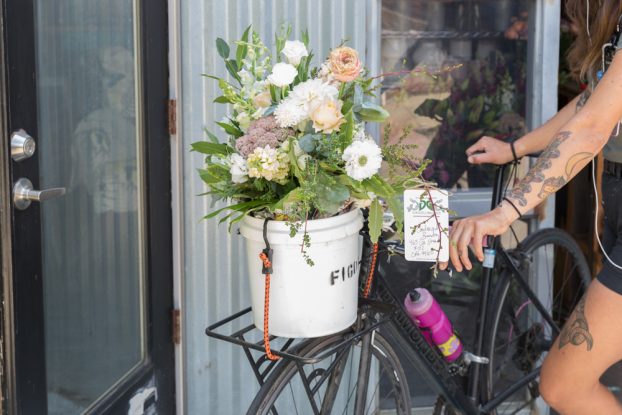
Before we get started, here’s a bit more about Pilar Zuniga, excerpted from her web site:
A California Native, Pilar came to the Bay area to attend UC Berkeley. Her interests then and now include biology, art and culture. She is fond of painting, drawing, ceramics, sewing and embroidery, remaking old things, finding vintage goods, gardening and ballet. She is a feminist, a Latina and a colorful individual who loves dogs and smiles often. Her floral design is born out of a desire to be creative and to support a local movement of flower growers.
Find and follow Gorgeous and Green at these social places:
Gorgeous and Green on Facebook
Gorgeous and Green on Instagram
Gorgeous and Green on Pinterest
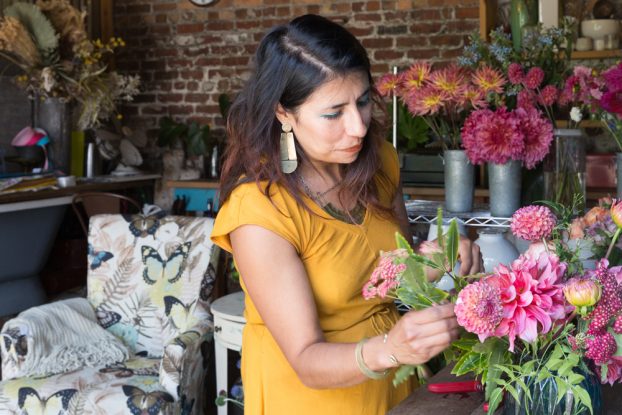
Thank you so much for joining this lovely and uplifting conversation with a kindred spirit – one who is a role model for how to honor your mission and values through the way you build your business.
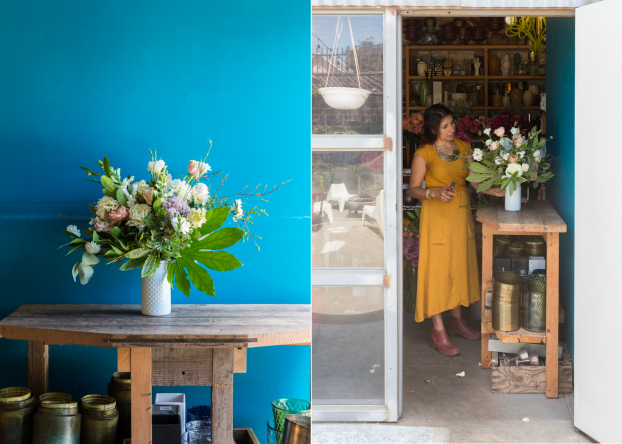
You are in for a real treat next June, because Pilar is one of the featured presenters at the 2021 Slow Flowers Summit, taking place June 28-30, 2021 at Filoli, in Woodside, California. We will soon resume promotion and registration for the postponed 4th annual Slow Flowers Summit and I’m thrilled that our host venu, Filoli, has done everything right to accommodate a safe, socially-distanced experience.
Pilar will present: BRANDING THE SUSTAINABLE FLORAL BUSINESS
She will discuss building an enduring brand around sustainable design and using her studio and platform to advocate for beautiful sustainability, including chemical-free design techniques and mechanics. You’ll learn more about how Pilar’s personal values have shaped Gorgeous and Green’s brand and mission in the marketplace. And, you’ll be wowed as she demonstrates her signature floral style using all-local botanical elements.
In our show notes, you’ll find a link to more details about the Summit, and to sign up for notices as we roll out an expanded speaker lineup, COVID-safe policies and more.

And a Podcast post-script. I’m recording the intro for today’s episode on Sunday, November 8th. In the U.S., we have endured a long, drawn out and agonizing political season, and I’m so pleased with the result of the presidential ticket that prevailed. Joe Biden is our president-elect and Kamala Harris, our vice president-elect, the first woman, the first Black woman and the first person of Asian descent to be elected to this office. I am exhaling, and I’ve heard from so many of you who are doing the same. If you didn’t support the Biden-Harris ticket, my wish for you is to have an open-mind, and to join me in a pledge to listen, speak my own truth, and show compassion for all humans.
Slow Flowers is committed to sustainability in all its forms, including sustaining dignity, equity and inclusion for people like us and not like us.
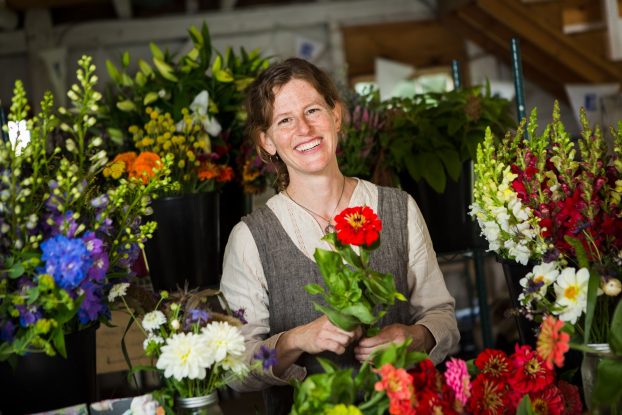
And, as long as we’re talking about elections, we want to congratulate Slow Flowers member and recent guest of this podcast, Stacy Brenner of Broadturn Farm in Scarborough, Maine. On November 3, Stacy posted this message on social media: I’m so grateful to announce that the voters in Buxton, Gorham, and Scarborough have voted for me to be the next State Senator for our district. I congratulate my opponent on a well-run campaign, and I promise to do my very best for our community in Augusta. Congratulations to Maine’s newest state senator and flower farmer, Stacy Brenner!
It’s time to announce two giveaways:
The winner of complimentary registration to Ellen Frost’s new online workshop — Growing Your Business with Local Flower Sourcing is: Zoe Dellinger of Dell Acres Farm and Greenhouse in Edinburg, Virginia! Congratulations, Zoe. You’ll hear from Ellen Frost with all the details very soon!

And congratulations to Amy Stoker of Lucky Bee Cut Flowers of Longmont, Colorado! As one of more than 200 respondents of our annual Slow Flowers member survey, your name was randomly selected for the BIG PRIZE — full registration to the 2021 Slow Flowers Summit, valued at $599. You’ll get to meet us at Filoli in late June, and meet Pilar Zuniga, today’s podcast guest in person! We’ll be sharing the insights from the member survey in the coming months — it was a huge success with more than 25% member participation.
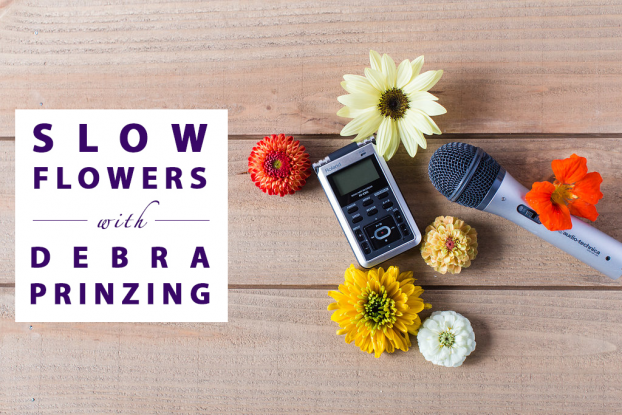
The Slow Flowers Podcast has been downloaded more than 657,000 times by listeners like you. Thank you for listening, commenting and sharing – it means so much.
As our movement gains more supporters and more passionate participants who believe in the importance of the American cut flower industry, the momentum is contagious. I know you feel it, too. I value your support and invite you to show your thanks and with a donation to support my ongoing advocacy, education and outreach activities. You can find the donate button in the column to the right.
Thank you to our Sponsors
This podcast is brought to you by Slowflowers.com, the free, nationwide online directory to florists, shops, and studios who design with American-grown flowers and to the farms that grow those blooms. It’s the conscious choice for buying and sending flowers.
Association of Specialty Cut Flower Growers. Formed in 1988, ASCFG was created to educate, unite, and support commercial cut flower growers. It mission is to help growers produce high-quality floral material, and to foster and promote the local availability of that product. Learn more at ascfg.org.
Longfield Gardens, which provides home gardeners with high quality flower bulbs and perennials. Their online store offers plants for every region and every season, from tulips and daffodils to dahlias, caladiums and amaryllis. Check out the full catalog at Longfield Gardens at longfield-gardens.com.
Seattle Wholesale Growers Market, a farmer-owned cooperative committed to providing the very best the Pacific Northwest has to offer in cut flowers, foliage and plants. The Growers Market’s mission is to foster a vibrant marketplace that sustains local flower farms and provides top-quality products and service to the local floral industry. Visit them at seattlewholesalegrowersmarket.com.
I’m Debra Prinzing, host and producer of the Slow Flowers Podcast. Next week, you’re invited to join me in putting more American grown flowers on the table, one vase at a time. And If you like what you hear, please consider logging onto iTunes and posting a listener review.
The content and opinions expressed here are either mine alone or those of my guests alone, independent of any podcast sponsor or other person, company or organization.
The Slow Flowers Podcast is engineered and edited by Andrew Brenlan. Learn more about his work at soundbodymovement.com.
Music Credits:
Lanky; Molly Molly; Turning on the Lights; Gaena
by Blue Dot Sessions
http://www.sessions.blue
Lovely by Tryad
http://tryad.bandcamp.com/album/instrumentals
http://creativecommons.org/licenses/by-sa/3.0/
In The Field
audionautix.com









